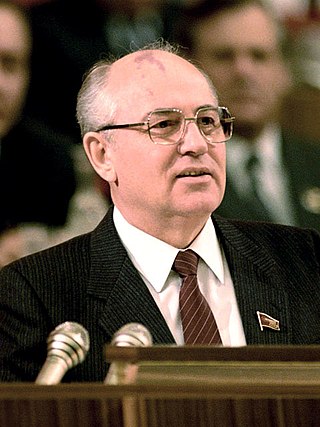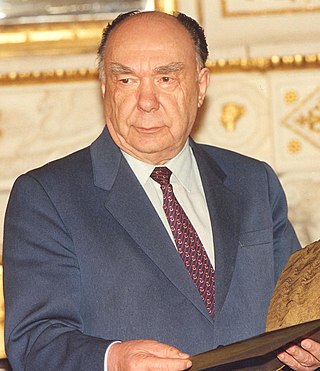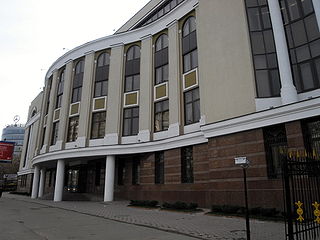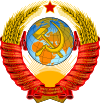
The Brezhnev Doctrine was a Soviet foreign policy that proclaimed that any threat to "socialist rule" in any state of the Soviet Bloc in Central and Eastern Europe was a threat to all of them, and therefore, it justified the intervention of fellow socialist states. It was proclaimed in order to justify the Soviet-led occupation of Czechoslovakia earlier in 1968, with the overthrow of the reformist government there. The references to "socialism" meant control by the communist parties which were loyal to the Kremlin. Soviet leader Mikhail Gorbachev repudiated the doctrine in the late 1980s, as the Kremlin accepted the peaceful overthrow of Soviet rule in all its satellite countries in Eastern Europe.
The history of the Soviet Union from 1982 through 1991 spans the period from the Soviet leader Leonid Brezhnev's death until the dissolution of the Soviet Union. Due to the years of Soviet military buildup at the expense of domestic development, and complex systemic problems in the command economy, Soviet output stagnated. Failed attempts at reform, a standstill economy, and the success of the proxies of the United States against the Soviet Union's forces in the war in Afghanistan led to a general feeling of discontent, especially in the Soviet-occupied Baltic countries and Eastern Europe.
Glasnost is a concept relating to openness and transparency. It has several general and specific meanings, including a policy of maximum openness in the activities of state institutions and freedom of information and the inadmissibility of hushing up problems. In Russian, the word glasnost has long been used to mean 'openness' and 'transparency'. In the mid-1980s, it was popularised by Mikhail Gorbachev as a political slogan for increased government transparency in the Soviet Union within the framework of perestroika, and the word came to be used in English in the latter meaning.

Mikhail Sergeyevich Gorbachev was a Soviet and Russian politician and statesman who served as the last leader of the Soviet Union from 1985 to the country's dissolution in 1991. He served as General Secretary of the Communist Party of the Soviet Union from 1985 and additionally as head of state beginning in 1988, as Chairman of the Presidium of the Supreme Soviet from 1988 to 1989, Chairman of the Supreme Soviet from 1989 to 1990 and the president of the Soviet Union from 1990 to 1991. Ideologically, Gorbachev initially adhered to Marxism–Leninism but moved towards social democracy by the early 1990s. He was the only Soviet leader born after the country's foundation.

Perestroika was a political reform movement within the Communist Party of the Soviet Union (CPSU) during the late 1980s, widely associated with CPSU general secretary Mikhail Gorbachev and his glasnost policy reform. The literal meaning of perestroika is "restructuring", referring to the restructuring of the political economy of the Soviet Union, in an attempt to end the Era of Stagnation.

Yegor Kuzmich Ligachyov was a Soviet and Russian politician who was a high-ranking official in the Communist Party of the Soviet Union (CPSU), and who continued an active political career in post-Soviet Russia. Originally an ally of Mikhail Gorbachev, Ligachyov became a challenger to his leadership.

"We will bury you" is a phrase that was used by Soviet First Secretary Nikita Khrushchev, leader of the USSR, while addressing Western ambassadors at a reception at the Polish embassy in Moscow on November 18, 1956. The phrase was originally translated into English by Khrushchev's personal interpreter Viktor Sukhodrev. The phrase was received very negatively by contemporary Western audiences, but some modern translators have suggested the phrase was misinterpreted or mistranslated.

Alexander Nikolayevich Yakovlev was a Soviet and Russian politician, diplomat, and historian. A member of the Politburo and Secretariat of the Communist Party of the Soviet Union throughout the 1980s, he was termed the "godfather of glasnost", and was the intellectual force behind Mikhail Gorbachev's reform programme of glasnost and perestroika.
Uskorenie was a slogan and a policy announced by Communist Party General Secretary Mikhail Gorbachev on 20 April 1985 at a Soviet Party Plenum, aimed at the acceleration of political, social and economic development of the Soviet Union. It was the first slogan of a set of reforms that also included perestroika (restructuring), glasnost (transparency), new political thinking, and demokratizatsiya (democratization).
The "Common European Home" was a concept created and espoused by former Soviet General Secretary Mikhail Gorbachev.

The time period of around 1985–1991 marked the final period of the Cold War. It was characterized by systemic reform within the Soviet Union, the easing of geopolitical tensions between the Soviet-led bloc and the United States-led bloc, the collapse of the Soviet Union's influence in Eastern Europe, and the dissolution of the Soviet Union in 1991.

After the establishment of diplomatic ties with the Soviet Union after the Cuban Revolution of 1959, Cuba became increasingly dependent on Soviet markets and military aid and was an ally of the Soviet Union during the Cold War. In 1972 Cuba joined the Council for Mutual Economic Assistance (Comecon), an economic organization of states designed to create co-operation among the communist planned economies, which was dominated by its largest economy, the Soviet Union. Moscow kept in regular contact with Havana and shared varying close relations until the end of the Soviet Union in 1991. Cuba then entered an era of serious economic hardship, the Special Period.
Robert David English is an American academic, author, historian, and international relations scholar who specializes in the history and politics of contemporary Eastern Europe, the USSR, and Russia. He is an associate professor of International Foreign Policy and Defense Analysis at the University of Southern California (USC) School of International Relations.

The New Union Treaty was a draft treaty that would have replaced the 1922 Treaty on the Creation of the Union of Soviet Socialist Republics (USSR) to salvage and reform the USSR. A ceremony of the Russian SFSR signing the treaty was scheduled for 20 August 1991 but was prevented by the August Coup a day earlier.

Canada and the Union of Soviet Socialist Republics had diplomatic relations from 1923 to 1927 and from 1941 until the USSR's dissolution in 1991. The relationship was often tense, owing to the Cold War and Canada's membership in NATO.

The Gorbachev Foundation is a non-profit organization headquartered in Moscow, founded by the former Soviet leader Mikhail Gorbachev in December 1991 and began its work in January 1992. The foundation researches the Perestroika era, as well as issues of Russian history and politics. It was financed by Gorbachev and donations by people and companies.

The Independent Democratic Party of Russia was the proposed name of a liberal party that was announced in late September 2008 to be founded by the former General Secretary of the Soviet Union, Mikhail Gorbachev, and State Duma deputy of Fair Russia, Alexander Lebedev. The Union of Social Democrats, led by Mikhail Gorbachev, is said to be its main base. Lebedev also stressed that the "party will press for legal and economic reform and promote the growth of independent media" as well as "less state capitalism", a reform of the justice system, and a stronger role of the parliament. At some point between 2014 and 2016, the website associated with the proposed party went offline.
Alexander Isaakovich Gelman, original given name Shunya, is a Bessarabian-born Soviet and Russian playwright, writer, and screenwriter.

The Murmansk Initiative was a series of wide-range foreign policy proposals concerning the Arctic region made in a speech by the Secretary-General of the Communist Party of the Soviet Union - Mikhail Gorbachev - on October 1, 1987 in Murmansk, Soviet Union, considered to be a trademark of his foreign policy.














